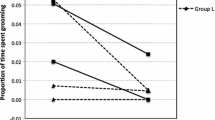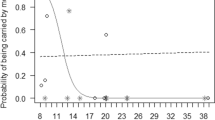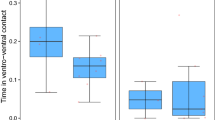Abstract
For all mammalian females, becoming a mother brings significant changes to their life. A dependent infant increases foraging demands during lactation and requires direct investment in maternal care. These new requirements might trigger changes in female behavior, such as reduced allocation of time to resting or social activities. We investigated how the maternal status affects time budgets in female Barbary macaques (Macaca sylvanus) (N = 17) in a free-ranging provisioned group in Gibraltar. We collected behavioral data (490 h) after infants were born during two periods. We found that females with dependent offspring had spent a reduced proportion of time resting, vigilant, and self-grooming compared with females without dependent offspring. Females with dependent offspring also groomed other females less often and spent 50% more time in proximity to other group members, particularly males, than females without dependent infants. Females with dependent offspring received 28% more grooming than other females received. This difference was due to interactions with males, which might be connected to the specific role of Barbary macaque males as primary infant caretakers. There was no change in feeding time of mothers compared with other females. We conclude that changes in the time budget of mothers in the provisioned population were related to the need to attend their infants, rather than increased foraging demands. Barbary macaque social organization and behavioral strategies give rise to complex effects of infant care on maternal social interactions and time budget.






Similar content being viewed by others
References
Altmann, J. (1974). Observational study of behavior: Sampling methods. Behaviour, 49, 227–267.
Altmann, J. (1980). Baboon mothers and infants. Harvard University Press.
Aureli, F., Preston, S. D., & De Waal, F. B. M. (1999). Heart rate responses to social interactions in free-moving rhesus macaques (Macaca mulatta): A pilot study. Journal of Comparative Psychology, 113(1), 59–65. https://doi.org/10.1037//0735-7036.113.1.59
Barrett, L., Halliday, J., & Henzi, S. P. (2006). The ecology of motherhood: The structuring of lactation costs by chacma baboons. Journal of Animal Ecology, 75(4), 875–886. https://doi.org/10.1111/j.1365-2656.2006.01105.x
Berman, C. M., Ionica, C. S., & Li, J. (2004). Dominance style among Macaca thibetana on Mt. Huangshan, China. International Journal of Primatology, 25(6), 1283–1312. https://doi.org/10.1023/B:IJOP.0000043963.77801.c3.
Borgeaud, C., Jankowiak, B., Aellen, M., Dunbar, R. I. M., & Bshary, R. (2021). Vervet monkeys socialize more when time budget constraints are experimentally reduced. Ethology, 127(9), 682–696. https://doi.org/10.1111/eth.13205
Bost, K. K., Cox, M. J., Burchinal, M. R., & Payne, C. (2002). Structural and supportive changes in couples’ family and friendship networks across the transition to parenthood. Journal of Marriage and Family, 64(2), 517–531. https://doi.org/10.1111/j.1741-3737.2002.00517.x
Brooks, M., Kristensen, K., van Benthem, K., Magnusson, A., Berg, C., Nielsen, A., Skaug, H., Maechler, M., & Bolker, B. (2017). glmmTMB balances speed and flexibility among packages for zero-inflated generalized linear mixed modeling. The R Journal, 2(9), 378–400. https://journal.r-project.org/archive/2017/RJ-2017-066/index.html.
Clutton-Brock, T. H., Albon, S. D., & Guinness, F. E. (1989). Fitness costs of gestation and lactation in wild mammals. Nature, 337, 260–262. https://doi.org/10.1038/337260a0
Coiner-Collier, S., Scott, R. S., Chalk-Wilayto, J., Cheyne, S. M., Constantino, P., Dominy, N. J., Elgart, A. A., Glowacka, H., Loyola, L. C., Ossi-Lupo, K., Raguet-Schofield, M., Talebi, M. G., Sala, E. A., Sieradzy, P., Taylor, A. B., Vinyard, C. J., Wright, B. W., Yamashita, N., Lucas, P. W., & Vogel, E. R. (2016). Primate dietary ecology in the context of food mechanical properties. Journal Od Human Evolution, 98, 103–118. https://doi.org/10.1016/j.jhevol.2016.07.005
de Vries, H., Netto, W. J., & Hanegraaf, P. L. H. (1993). MatMan: a program for the analysis of sociometric matrices and behavioural transition matrices. Behaviour, 125(3/4), 157–175. https://www.jstor.org/stable/4535109.
de Vries, H., Stevens, J. M. G., & Vervaecke, H. (2006). Measuring and testing the steepness of dominance hierarchies. Animal Behaviour, 71(3), 585–592. https://doi.org/10.1016/j.anbehav.2005.05.015
Deag, J., & Crook, J. (1971). Social behaviour and ‘agonistic buffering’ in the wild Barbary macaque Macaca sylvana L. Folia Primatologica, 15(3–4), 183–200. https://doi.org/10.1159/000155378
Dias, P. A. D., Rangel-Negrín, A., & Canales-Espinosa, D. (2011). Effects of lactation on the time-budgets and foraging patterns of female black howlers (Alouatta pigra). American Journal of Physical Anthropology, 145(1), 137–146. https://doi.org/10.1002/ajpa.21481
Dolhinow, P. (1978). A behavior repertoire for the Indian langur monkey (Presbytis entellus). Primates, 19(3), 449–472. https://doi.org/10.1007/BF02373308
Dunbar, R. I. (1991). Functional significance of social grooming in primates. Folia Primatologica, 57(3), 121–131. https://doi.org/10.1159/000156574
Dunbar, R. I. M. (1992). Time: A hidden constraint on the behavioural ecology of baboons. Behavioral Ecology and Sociobiology, 31(1), 35–49. https://doi.org/10.1007/BF00167814
Dunbar, R. I. M., & Dunbar, P. (1988). Maternal time budgets of gelada baboons. Animal Behaviour, 36(4), 970–980. https://doi.org/10.1016/S0003-3472(88)80055-1
Dunbar, R. I. M., & Sharman, M. (1984). Is social grooming altruistic? Zeitschrift Für Tierpsychologie, 64(2), 163–173. https://doi.org/10.1111/j.1439-0310.1984.tb00357.x
Frank, R. E., & Silk, J. B. (2009). Grooming exchange between mothers and non-mothers: The price of natal attraction in wild baboons (Papio anubis). Behaviour, 146(7), 889–906. https://doi.org/10.1163/156853908X396656
Gammell, M. P., De Vries, H., Jennings, D. J., Carlin, C. M., & Hayden, T. J. (2003). David’s score: A more appropriate dominance ranking method than Clutton-Brock et al.’s index. Animal Behaviour, 66(3), 601–605. https://doi.org/10.1006/anbe.2003.2226.
Gumert, M. D. (2007). Grooming and infant handling interchange in Macaca fascicularis: The relationship between infant supply and grooming payment. International Journal of Primatology, 28(5), 1059–1074. https://doi.org/10.1007/s10764-007-9202-0
Harrison, M. J. S. (1985). Time budget of the green monkey, Cercopithecus sabaeus: Some optimal strategies. International Journal of Primatology, 6(4), 351–376. https://doi.org/10.1007/BF02736383
Hartig, F. (2022). DHARMa: Residual diagnostics for hierarchical (multi-level/mixed) regression models. R package version 0.4.6. https://CRAN.R-project.org/package=DHARMa.
Henzi, S., & Barrett, L. (1999). The value of grooming to female primates. Primates, 40(1), 47–59. https://doi.org/10.1007/bf02557701
Henzi, S. P., & Barrett, L. (2002). Infants as a commodity in a baboon market. Animal Behaviour, 63(5), 915–921. https://doi.org/10.1006/ANBE.2001.1986
Horwich, R. H., & Wurman, C. (1978). Socio-maternal behaviors in response to an infant birth in Colobus guereza. Primates, 19(4), 693–713. https://doi.org/10.1007/BF02373636
Hrdy, S. B. (2009). Mothers and others: The evolutionary origins of mutual understanding. Harvard University Press.
Kuběnová, B., Ostner, J., Schülke, O., Majolo, B., Šmilauer, P., & Konečná, M. (2019a). The effect of dominance rank on the distribution of different types of male–infant–male interactions in Barbary macaques (Macaca sylvanus). International Journal of Primatology, 40(3), 300–315. https://doi.org/10.1007/s10764-019-00086-x
Kuběnová, B., Ostner, J., Schülke, O., Majolo, B., Šmilauer, P., Waterman, J., Tkaczynski, P., & Konečná, M. (2019b). The male and female perspective in the link between male infant care and mating behaviour in Barbary macaques. Ethology, 125, 914–924. https://doi.org/10.1111/eth.12948
Lappan, S. (2009). The effects of lactation and infant care on adult energy budgets in wild siamangs (Symphalangus syndactylus). American Journal of Physical Anthropology, 140(2), 290–301. https://doi.org/10.1002/ajpa.21069
Lhota, S., Roubová, V., Gregorová, V., & Konečná, M. (2019). Complex patterns of grooming and sexual activity in Barbary macaques (Macaca sylvanus). American Journal of Primatology, 9(81), e23040. https://doi.org/10.1002/ajp.23040.
Lycett, J. E., Henzi, S. P., & Barrett, L. (1998). Maternal investment in mountain baboons and the hypothesis of reduced care. Behavioral Ecology and Sociobiology, 42(1), 49–56. https://doi.org/10.1007/s002650050410
Magurran, A. E. (1988). Ecological diversity and its measurement. Cambridge University Press.
Massen, J. J. M., Overduin-de Vries, A. M., de Vos-Rouweler, A. J. M., Spruijt, B. M., Doxiadis, G. G. M., & Sterck, E. H. M. (2012). Male mating tactics in captive rhesus macaques (Macaca mulatta): The influence of dominance, markets, and relationship quality. International Journal of Primatology, 33(1), 73–92. https://doi.org/10.1007/s10764-011-9552-5
Mehlman, P. T. (1989). Comparative density, demography, and ranging behavior of Barbary macaques (Macaca sylvanus) in marginal and prime conifer habitats. International Journal of Primatology, 10, 269–292. https://doi.org/10.1007/BF02737418
McCabe, G. M., & Fedigan, L. M. (2007). Effects of reproductive status on energy intake, ingestion rates, and dietary composition of female Cebus capucinus at Santa Rosa, Costa Rica. International Journal of Primatology, 28, 837–851.
Ostner, J., Vigilant, L., Bhagavatula, J., Franz, M., & Schülke, O. (2013). Stable heterosexual associations in a promiscuous primate. Animal Behaviour, 86(3), 623–631. https://doi.org/10.1016/J.ANBEHAV.2013.07.004
Paul, A., Kuester, J., & Arnemann, J. (1996). The sociobiology of male–infant interactions in Barbary macaques, Macaca sylvanus. Animal Behaviour, 51(1), 155–170. https://doi.org/10.1006/ANBE.1996.0013
Price, E. C. (1992). Changes in the activity of captive cotton-top tamarins (Saguinus oedipus) over the breeding cycle. Primates, 33(1), 99–106. https://doi.org/10.1007/BF02382765
R Core Team (2022). R: A language and environment for statistical computing. R Foundation for Statistical Computing, Vienna, Austria. URL https://www.R-project.org/.
Rangel-Negrín, A., Coyohua-Fuentes, A., de la Torre Herrera, A., Cano-Huertes, B., Reynoso-Cruz, E., Ceccarelli, E., Gómez Espinosa, E., Chavira Ramírez, D. R., Moreno-Espinoza, D., Canales-Espinosa, D., Maya-Lastra, N., Cruz-Miros, P., Cañadas Santiago, S., Garau, S., & Dias, P. A. D. (2021). Female reproductive energetics in mantled howler monkeys (Alouatta palliata): A follow-up study. American Journal of Physical Anthropology, 174, 396–406. https://doi.org/10.1002/ajpa.24222
Roubová, V., Konečná, M., Šmilauer, P., & Wallner, B. (2015). Whom to groom and for what? Patterns of grooming in female Barbary macaques (Macaca sylvanus). PLoS ONE, 10(2), e0117298. https://doi.org/10.1371/journal.pone.0117298.
Saj, T., Sicotte, P., & Paterson, J. (1999). Influence of human food consumption on the time budget of vervets. International Journal of Primatology, 20(6), 977–994.
Shutt, K., MacLarnon, A., Heistermann, M., & Semple, S. (2007). Grooming in Barbary macaques: Better to give than to receive? Biology Letters, 3(3), 231–233. https://doi.org/10.1098/rsbl.2007.0052
Silk, J. B. (1987). Activities and feeding behavior of free-ranging pregnant baboons. International Journal of Primatology, 8(6), 593–613. https://doi.org/10.1007/BF02735779
Silk, J. B., Beehner, J. C., Bergman, T. J., Crockford, C., Engh, A. L., Moscovice, L. R., Wittig, R. M., Seyfarth, R. M., & Cheney, D. L. (2009). The benefits of social capital: Close social bonds among female baboons enhance offspring survival. Proceedings of the Royal Society b: Biological Sciences, 276(1670), 3099–3104. https://doi.org/10.1098/rspb.2009.0681
Small, M. F. (1990). Alloparental behaviour in Barbary macaques, Macaca sylvanus. Animal Behaviour, 39, 297–306. https://doi.org/10.1016/S0003-3472(05)80874-7
Sonnweber, R. S., Ravignani, A., Stobbe, N., Schiestl, G., Wallner, B., Fitch, W. T. (2015). Rank-dependent grooming patterns and cortisol alleviation in Barbary macaques. American Journal of Primatology, 77, 688–700. https://doi.org/10.1002/ajp.22391.
Acknowledgements
The authors are grateful to Eric Shaw, John Cortes, Damian Holmes, and Dale Laguea of the Gibraltar Ornithological and Natural History Society (GOHNS) for their support during field work. Thanks to David Boukal, Barbora Kuběnová, and Vedrana Šlipogor for their useful comments on earlier versions of the manuscript and to the editor Joanna Setchell and two anonymous reviewers for insightful comments, which helped to significantly improve the quality of the manuscript. This work was supported by the Czech-Austrian Aktion Program for Cooperation in Science and Education (Project 50p13; Project 53p6) (MK, BW), Zdeněk Veselovský student prize from ČSEtS (VR, MK) and GAJU No. 04-151/2016/P (VR, MK).
Author information
Authors and Affiliations
Contributions
MK and SL conceived the idea; MK and VR collected data; BW provided access to study site and resources; MK and BW acquired funding; MK statistical analysis; MK and SL prepared the initial draft; MK and SL wrote the manuscript with comments and edits from VR and BW.
Corresponding author
Additional information
Handling Editor: Joanna (Jo) M. Setchell
Supplementary Information
Below is the link to the electronic supplementary material.
Rights and permissions
Springer Nature or its licensor (e.g. a society or other partner) holds exclusive rights to this article under a publishing agreement with the author(s) or other rightsholder(s); author self-archiving of the accepted manuscript version of this article is solely governed by the terms of such publishing agreement and applicable law.
About this article
Cite this article
Konečná, M., Roubová, V., Wallner, B. et al. The Effect of Maternal Status on Time Budget in Female Barbary Macaques (Macaca sylvanus). Int J Primatol 44, 540–557 (2023). https://doi.org/10.1007/s10764-023-00360-z
Received:
Accepted:
Published:
Issue Date:
DOI: https://doi.org/10.1007/s10764-023-00360-z




